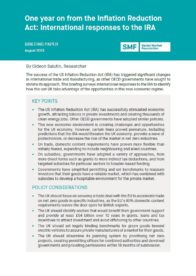The success of the US Inflation Reduction Act (IRA) has triggered significant changes in international trade and manufacturing, as other OECD governments have sought to imitate its approach. This briefing surveys international responses to the IRA to identify how the can UK take advantage of the opportunities in this new economic regime.
KEY POINTS
- The US Inflation Reduction Act (IRA) has successfully stimulated economic growth, attracting billions of private investment and creating thousands of clean energy jobs. Other OECD governments have adopted similar policies.
- This new economic environment is creating challenges and opportunities for the UK economy. However, certain fears proved premature, including predictions that the IRA would threaten the UK economy, provoke a wave of protectionism, or decrease the role of the market in net zero industries.
- On trade, domestic content requirements have proven more flexible than initially feared, expanding to include neighbouring and allied countries.
- On subsidies, governments have adopted a variety of approaches, from more direct forms such as grants to more indirect tax deductions, and from targeted subsidies for particular sectors to broader-based funding.
- Governments have simplified permitting and set benchmarks to reassure investors that their goods have a reliable market, which has combined with subsidies to develop a hospitable environment for the private market.
POLICY CONSIDERATIONS
- The UK should focus on securing a trade deal with the EU to accelerate trade on net zero goods in specific industries, as the EU’s 40% domestic content requirements leaves the door open for British exports.
- The UK should identify sectors that would benefit from government support and provide at least £54 billion over 10 years in grants, loans and tax incentives to attract investment and avoid offshoring to other countries.
- The UK should set legally binding benchmarks for green goods beyond electric vehicles to assure private manufacturers of a market for their goods.
- The UK should streamline its planning system by prioritising net zero projects, creating permitting offices for combined authorities and devolved governments and providing permissions within 18 months of submission.

DOWNLOAD THE BRIEFING: PDF
